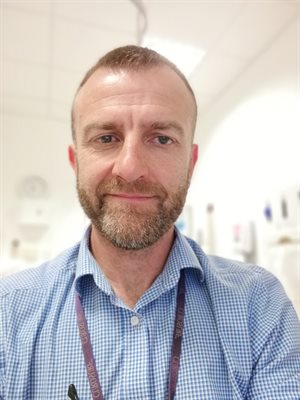"It all felt really positive, and that St George's was leading the way."

Consultant Obstetrician and Gynaecologist and Head of MBBS Assessment, Kevin Hayes, was part of the original Graduate Entry Medicine team. He was recently appointed to a National Board relating to the Forthcoming National Medical Licencing Assessment Medical Licensing Assessment - GMC (run by GMC and Medical Schools council) - which reflects his high standing in MBBS Assessment nationally. Under his leadership, St George's has already taken part in various Pilot assessments to support St George's in the delivery of online assessments on the MSC Assessment Alliance Platform from 2020 onwards due to the impact of the Covid-19 pandemic.
Kevin spoke to us to share his memories of the early days of the Graduate Entry Medicine programme, and what he has gone on to do since.
What did it feel like being part of a course that was the first of its kind in the UK?
Very exciting and a bit scary as everything had to be ready by very specific dates and time just seemed to disappear... There was lots of enthusiasm from everyone for something new and there was a really optimistic feel about such an important project.
Then the students arrived! They similarly felt a real buzz and wanted to be part of something special.
It all felt really positive, and that St George's was leading the way.
How has the Graduate Entry Medicine programme changed since you first started as a member of the team?
The ethos of the course has not actually changed that much though the structure has changed in-line with our five-year course to some degree (small, specific changes really). It is no longer ‘new’ so inevitably it has become part of the St George's DNA - maybe it’s me getting older but the graduates feel overall a bit younger than at the start.
What have you gone on to do since?
I have taken on some senior roles in the Medical School and Trust. I have been the Head of MBBS (Medicine) Assessment (all years and courses) for the last 4-5 years which is challenging but I really love getting assessment right (most of the time!).
I am the clinical Lead for Early Pregnancy, Acute Gynaecology and Gynaecological ultrasound in the Trust and run a tertiary referral service for the whole South-East of England for gynaecological cancer gene carriers, which is fascinating and rewarding. I have a number of other national and international academic roles too, and this helps to keep in touch with the bigger picture and has allowed me to travel all over the world.
What are some of your earliest memories of the course? Work, work, work! Endless PBL (Problem-based learning) snacks, a hugely committed first cohort (in fact all have been), getting things delivered the night before, planning the Obs & Gynae and Life Cycle courses, mopping up some tears (not mine!), fretting about how the students would do in their exams (I didn't really need to worry!), teaching clinical skills, working with an amazing (compact) group of colleagues - all great stuff!
What was the best thing about being part of the Graduate Entry Medicine programme team?
The sense of something so new and important that we just had to get it right for the students and the university, and indeed to show the UK that Graduate Entry Medicine really works.
Why would you recommend studying Graduate Entry Medicine?
Asking teenagers to decide what they want to do at essentially the age of fifteen, so they make the right A-level choices to study medicine, may work for some but we repeatedly see students who have chosen medicine for the wrong reasons, or someone else has chosen it for them. They also often have absolutely no idea what the job, or indeed working full stop, is about. The extra time and maturity of doing a primary degree(s) and / or going off and working for years in other sectors invariably means that the right motivation for studying medicine is in place. This is so important because being a doctor is an amazing job, but it is hard and operates within a very imperfect system.
Being happy with your life choices is the single most important road to a happy life as a doctor. Happy doctors make good doctors. Graduate Entry Medicine allows a second chance that was much harder to achieve historically. Having an undergraduate and postgraduate route increases the pool of great future doctors. I have been doing this long enough now that I have worked with our graduates (on both courses) from juniors to even consultant colleagues and it is simply brilliant to see that happen.